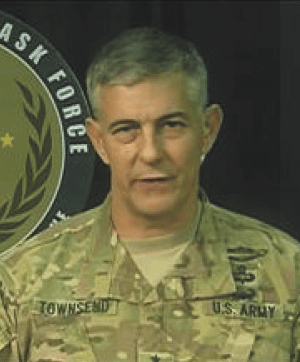 Lt. Gen. Stephen Townsend is the seventh American general since 2003 to assume command of war operations in Iraq. Townsend left his command of XVIII Airborne Corps and Ft. Bragg in August to become commander of Combined Joint Task Force – Operation Inherent Resolve. His objective is to defeat the Islamic State (ISIS) while simultaneously diffusing the region’s ethnic and religious conflicts that have drawn in nearly every major country across Europe and the Middle East. He heads coalition forces in the battle for Mosul. Then he must pursue ISIS into Syria, where the U.S. has few allies on the ground, and negotiate a highly complex battlefield.
Lt. Gen. Stephen Townsend is the seventh American general since 2003 to assume command of war operations in Iraq. Townsend left his command of XVIII Airborne Corps and Ft. Bragg in August to become commander of Combined Joint Task Force – Operation Inherent Resolve. His objective is to defeat the Islamic State (ISIS) while simultaneously diffusing the region’s ethnic and religious conflicts that have drawn in nearly every major country across Europe and the Middle East. He heads coalition forces in the battle for Mosul. Then he must pursue ISIS into Syria, where the U.S. has few allies on the ground, and negotiate a highly complex battlefield.
Military analysts say Townsend is overseeing a shift from conventional warfare to a mission dependent upon unconventional U.S military advisors and foreign troops. He has the help of the four star general who has spent much of his career in special operations. Former Special Operations commander Gen. Charles Votel is now in charge of Central Command, which has American military oversight of Middle East operations. He has emphasized the need for special operations forces to work hand-in-hand with traditional forces. Yet only 300 American special forces have been advising the Syrian Democratic Front (SDF) in the fight against ISIS. The coalition force of 30,000 is mainly made up of Kurdish troops and a sizable Syrian-Arab contingent. In Washington, Townsend faces historic uncertainty and a new Commander-in-Chief in January.
One of his diplomatic challenges is Kurdish forces being used in an offensive on Raqqa, a sensitive matter for neighboring Turkey, which is wary of a strong Kurdish military presence on its border. A power struggle has played out in public as Townsend vowed to march on Raqqa with Kurdish forces regardless of Turkey’s opposition. “Turkey doesn’t want to see us operating with the SDF anywhere, particularly in Raqqa,” Townsend acknowledged in a press briefing. But, he added, “we think there’s an imperative to get isolation in place around Raqqa because our intelligence feeds tell us that there is significant external attack planning going on” there. The U.S. also depends on Turkey for use of Incirlik Air Base, a hub for U.S. air operations near its southern border.
Townsend did say the isolation of Raqqa would be primarily undertaken by non-Kurdish Syrian forces. He believes there are currently enough of those fighters available to begin encircling the city soon. But he anticipates that the battle for Raqqa will take longer than the current battle for Mosul given that anti-ISIS partners in Syria do not have the resourcing available to the Iraqi military. Townsend says the timing of the offensive to retake Raqqa was not precipitated by the potential of an overseas terror plot although that concerns him. “We want to pressure Raqqa so that the enemy doesn’t have a convenient place to go,” said Townsend